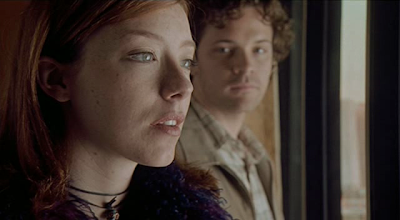 Contents of the first issue I read, Spring/Summer 1986:
Contents of the first issue I read, Spring/Summer 1986:Volume 17, No. 2: Articles:
The Limits of the Peace Movement, Brian Martin
From Proudhon to Bakunin, Daniel Guérin
The Haymarket Affair and Lucy Parsons: 100th Anniversary, Arlene Meyers
The Soviet Union versus Socialism, Noam Chomsky
Looking Back at Spain, Murray Bookchin
On Gustav Landauer, Russell Berman and Tim Luke
Book Reviews:
The Search for Community: From Utopia to a Co-operative Society, by George Melnyk, reviewed by George Woodcock
The Making of the Second Cold War, by Fred Halliday, reviewed by E.P. Thompson
The Polish Revolution: Solidarity, 1980-82, by Timothy Garton Ash, reviewed by E.P. Thompson

Our Generation began its run of more than three decades as Our Generation Against Nuclear War, a journal closely associated with the Campaign for Nuclear Disarmament and similar groups, some more broadly pacifist and even more willing to challenge the status quo. By the end of the 1960s, it was most of the way toward being the journal of anarchist, libertarian socialist and social-ecologist/Green thought and history that it remained through its last issue in 1993. Leftists with pacifist sympathies, such as Bertrand Russell, and Elise and Kenneth Boulding, appeared in early issues, along with the not so pacifist or at least more militant Todd Gitlin and Farley Mowat, with the likes of J. B. Priestley splitting the difference. The scope of the journal widened throughout the 1960s, with attention paid to Canadian politics and to larger critiques, often of both the corporatist "First World" and of the Marxist/Leninist (and Stalinist) tendencies most notable in the "Second" and "Third World"...the movement slightly away from the primarily pacifist, though radical, Liberation and toward the position of UK-based anarchist magazine Freedom, along with such US-based fellow travelers as the increasingly anarchist newspaper The Fifth Estate, was rather seamless. Our Generation could be a bit dry or slight at times, as can every other political journal (and, in fact, nearly every other kind of literary production), but often and proudly presented much of the best of the then-current writing in anarchist and other left-libertarian thought, much of it better-grounded in history and scientific practice (particularly in the journal's generally supportive coverage of the Green movement worldwide, and its support for the social ecologists over the "deep" ecologists. I miss it, and am glad that some of the issues are now readable online. Dimitrios Roussopoulos, a co-editor and contributor to OG from early on and the editor for the latter decades, began publishing, in 1996 through the book arm of the project, Black Rose Books, a series of anthologies drawing on the journal, including one simply titled Our Generation Against Nuclear War sampling from the early issues, and several numbered volumes of The Anarchist Papers and The Radical Papers.



In the current season of partisan politics served up in its most wasteful and shallow and distorting way, it's particularly easy to see why one might be drawn to an alternative to Politics As Usual in North America and the larger world, even without stopping to consider who benefits and how much (and how little) from the policies and structures brought about by various flavors of the Right, the Center (where the Democrats live with few exceptions, but not comfortably nor without constant tremors and second-guesses), and the supposed Left of Leninists and such, now much less in evidence on the world scene (even with such last holdouts of Stalinism as North Korea, and the token genuflection toward Lenin and Mao in that new face of fascism, The Maquiladoras' Republic of China). I'm surprised it took me till early in 1986 to find OG, not that it was too commonly carried by newsstands or public libraries in the U.S.; Chris Gunderson's review of the journal in the Utne Reader was what put me onto it, probably the greatest favor either that magazine or Gunderson are ever likely to do me (my later personal interaction with Gunderson was brief, and will remain that way, mostly related to the 1989 Anarchist Gathering in San Francisco, and the sessions leading up to that)(for its part, Utne Reader was always fitfully interesting to me at best, in rather stark distinction to the then usually-excellent, re-energized Harper's, like UR in the early '80s beginning a format of wide-ranging reprints from other magazines and print sources to augment original contributions, a policy both magazines still follow). Reading that first issue for me, with its long essay by Murray Bookchin, and shorter, deft pieces particularly by Noam Chomsky, Daniel Guérin and George Woodcock, let me know that I was hardly alone in the world in my outlook (however rare "out" libertarian socialists might be, compared to those touting various strains of Marxism and the ever-less socialist social democrats), and I was ready for more. Dimitrios Roussopoulos's Montreal-based magazine (all in English) was my gateway to journals such as Baltimore-based Social Anarchism (to which I would eventually contribute), and Anarchy: A Journal of Desire Armed (where the general Situationist inclinations and constant carping put me off) and The Match! (where the amount of the magazine devoted to editor/publisher Fred Woodworth's personal hassles and the constant carping put me off). Such other magazines as Factsheet Five and Profane Existence, introduced to me by my increasingly punk rock-loving/anarcha-feminist womanfriend, who found them through MaximumRocknRoll and Flipside magazines, large national punk fanzines gone essentially professional, followed not long after we met...I would eventually contribute to FF, PE and MRR, as well. And, for that matter, to The Progressive. But, perhaps oddly, never to Our Generation.
For more of today's books, please see Patti Abbott's blog.

















































